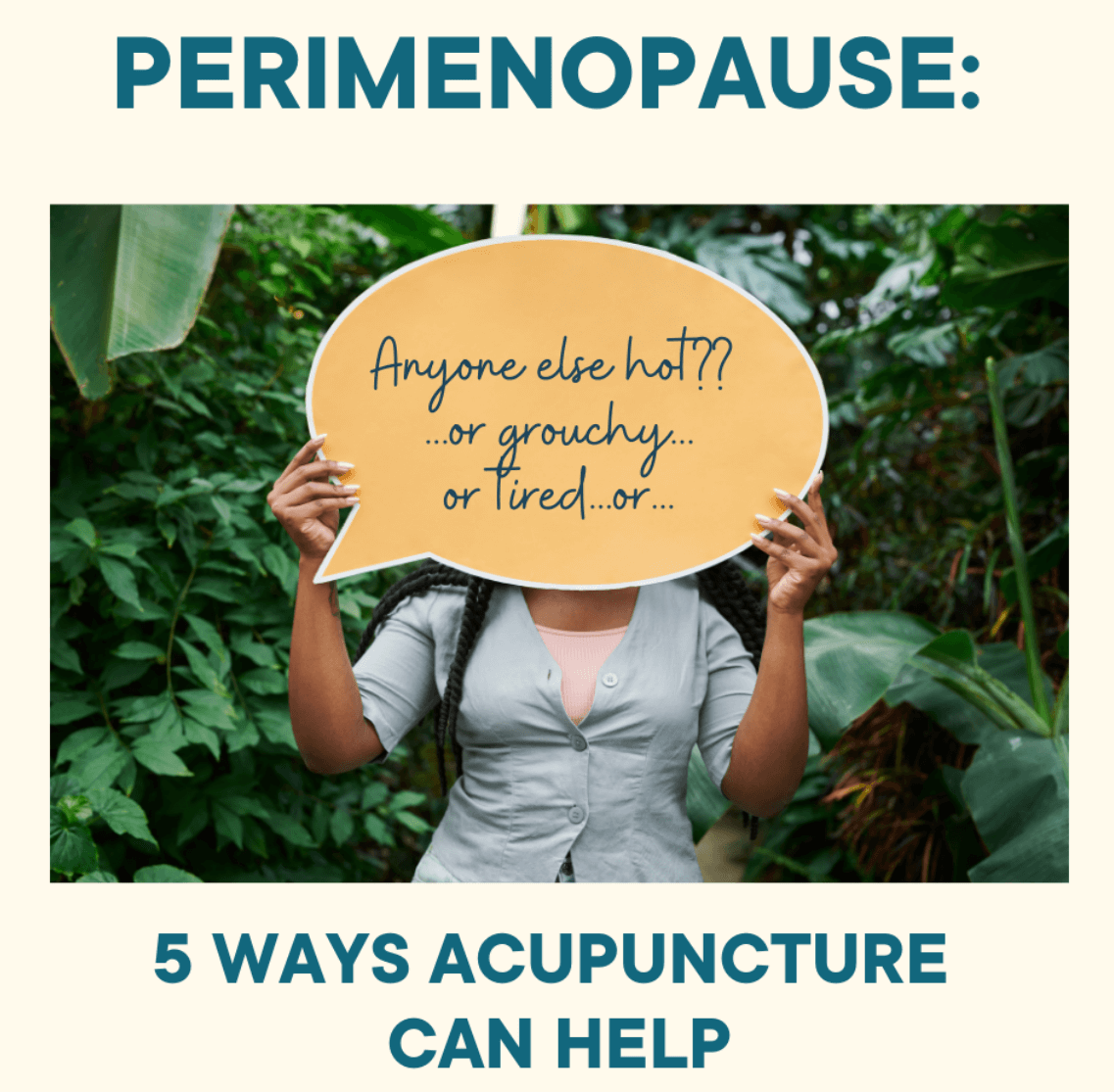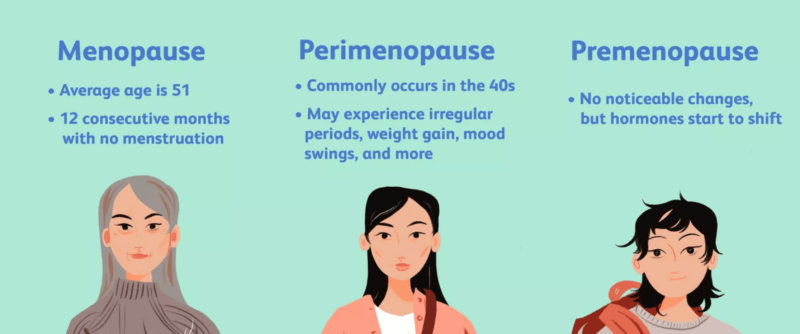Acupuncture and Perimenopause

What is Perimenopause?
The perimenopause transition phase refers to the period of time leading up to menopause, during which a woman’s body undergoes hormonal and physiological changes. It typically starts in a woman’s 40s but can occur earlier or later. Perimenopause is characterized by fluctuations in hormone levels, especially estrogen. It can cause various symptoms such as irregular menstrual cycles, hot flashes, night sweats, mood swings, sleep disturbances, and vaginal dryness. Acupuncture can assist.
What is Acupuncture?
Acupuncture is a traditional Chinese medicine practice that involves inserting thin needles into specific points on the body to stimulate energy flow and restore balance. While the exact mechanisms are not fully understood, acupuncture is believed to influence the central nervous system, modulate hormone levels and promote overall well-being.
TCM (Traditional Chinese Medicine) & the Female Life Cycles
In Chinese Medicine the age of menopause is seen as the 7×7 rule = 49 years.
As a female our cycles are 7 years. We hit a milestone every 7 years.
- After two 7-year cycles we generally will have or are due to begin menstruation.
- At 21 we are ready to make babies.
- At the age of 49 we are set to begin menopause. However, Menopause can be entered into between 45-55 years.
TCM, Acupuncture and Perimenopause
When treating perimenopause, as a Traditional Chinese Medicine (TCM) practitioner, I begin to work with women once they enter their 40s. I look at their overall health and wellbeing. I begin with diet and exercise changes – making sure hormones are balanced and that nutrition, sleep, exercise, and social interactions/support are all working well.
The changes in a women’s body at the beginning of perimenopause can be challenging. In TCM our job is to make sure that the body stays in balance and the transition from perimenopause through to menopause goes as smoothly as possible.

Typically, when I assist women experiencing perimenopause we focus on keeping their periods regular. I also use TCM to assist with managing night sweats, hot flushes, mood changes and breast tenderness. Many women can feel more irritable, as well as tired, so we focus on sleep as a priority too.
YIN energy and Perimenopause
As a TCM practitioner I focus on building up the YIN of a female as well as blood. By building up yin energy (incl body fluids / blood) I can help keep the body and hormones in balance during this time. I also focus on the free flow of energy and working through the liver and gallbladder meridians – ensuring that the liver and gallbladder organs are balanced and energy flows freely. This assists greatly to reduce hot flushes, mood swings, night sweats, fatigue and sleep issues. Supporting a woman through this phase I can greatly impact her quality of life and vitality. Improvements in her overall health can be made and she may even feel healthier and have more vitality than she has previously known.
It is important to note that I treat holistically. Diet and exercise recommendations, acupuncture AND herbal medicine. Everyone is different and I treat according to the women’s individual TCM diagnosis.
5 ways acupuncture helps during perimenopause
- Hot flashes and night sweats: These are common symptoms due to hormonal fluctuations, particularly a decrease in estrogen levels. Acupuncture is thought to stimulate the release of endorphins, which can help regulate body temperature and reduce the frequency and intensity of hot flashes and night sweats. Additionally, acupuncture may promote better blood circulation which helps to alleviate these symptoms.
- Sleep disturbances: Perimenopause can often bring about sleep disturbances such as insomnia, difficulty falling asleep, or frequent waking during the night. Acupuncture can help by promoting relaxation, reducing anxiety, and inducing a state of calmness. By targeting specific points on the body, acupuncture may help regulate the sleep-wake cycle and improve overall sleep quality.
- Mood swings and emotional well-being: Hormonal fluctuations can lead to mood swings, irritability, anxiety, and depression. Acupuncture is believed to influence the release of neurotransmitters and hormones, such as serotonin and endorphins, which can help stabilize mood and promote emotional well-being. By restoring balance in the body’s energy pathways, acupuncture may have a positive impact on emotional symptoms.
- Menstrual irregularities: Perimenopause often brings changes in menstrual cycles, including irregular periods, heavy bleeding, or longer or shorter cycles. Acupuncture may help regulate menstrual patterns by influencing hormone levels, particularly estrogen and progesterone. By stimulating specific points related to the reproductive system, acupuncture may help restore hormonal balance and improve menstrual regularity.
- Vaginal dryness: Decreased estrogen levels can lead to vaginal dryness and discomfort during sexual intercourse. Acupuncture may help address this symptom by promoting blood flow to the genital area, improving vaginal lubrication, and reducing vaginal dryness. By stimulating specific points related to reproductive health, acupuncture may contribute to the overall health and vitality of the reproductive system.
Perimenopause and the Matriarchal Line
I have seen how perimenopause and menopause affects every women differently. If you are able to, ask your mother, sisters and aunts about their experiences of perimenopause and menopause as it can be very similar between women in the same family blood line.
Remember that the age of menopause also differs. I have worked with some women who have entered menopause early in their late 30’s early 40’s. Other clients have not gone into menopause until later in their 50s. I believe that a lot of this is also due to our genetics, our environment, nutrition and lifestyle.
Traditional Chinese Medicine – Acupuncture and Chinese herbal medicine can provide all the supports mentioned above AND is also potentially an alternative to hormone replacement therapy.
References
- Avis, NE et al. Acupuncture in Menopause (AIM) Study: A Pragmatic, Randomized Controlled Trial. Menopause.
- Better Health Victoria. Hormone Replacement Therapy (HRT) and menopause.
- British Medical Journal. Acupuncture may ease troublesome menopausal symptoms.
